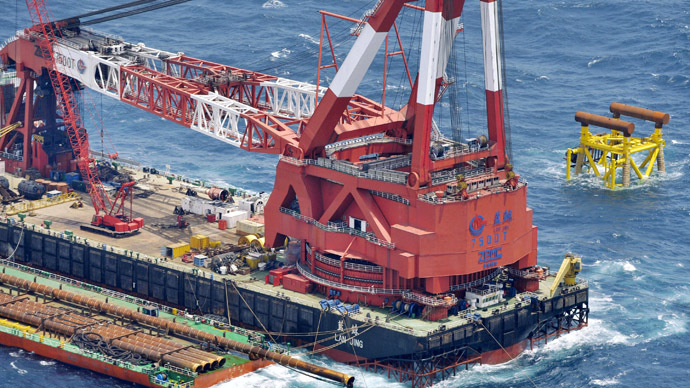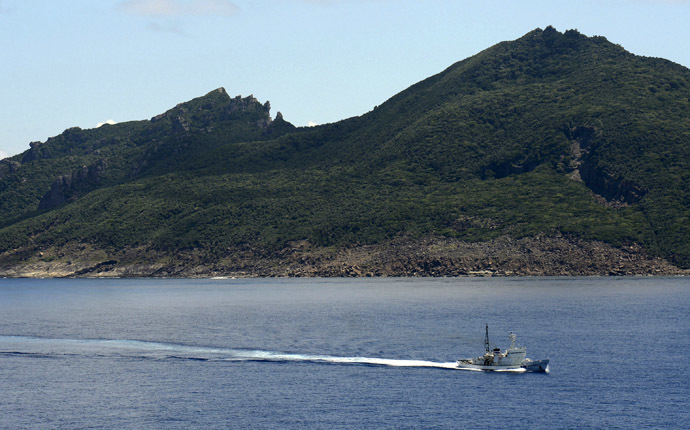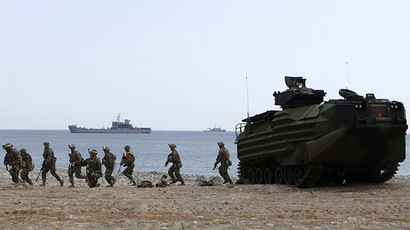Japan to deploy ships after China detected drilling in disputed waters - report

Japan has allegedly ordered geological survey ships to prepare for possible deployment after the Chinese were reportedly detected drilling in Japanese waters near the disputed area of the Senkaku Islands in the East China Sea, a source told Reuters.
The Japan Oil, Gas and Metals National Corporation (JOGMEC) has been ordered to put both its survey ships , the Shigen and the Hakurei, on standby and to prepare to deploy without any foreign members of staff on board, according to the source .
Japan warned China not to expand gas exploration in the East China Sea on Thursday, following a media report according to which Chinese state-run oil companies plan to develop seven new gas fields in the sea, possibly siphoning gas from the seabed beneath waters claimed by Japan, Kyodo news agency reported.
"We will never accept development of gas fields in the area over which there are conflicting claims in a unilateral manner," Chief Cabinet Secretary Yoshihide Suga said at a press conference. Though he added that officials are still gathering information to confirm the report.
After in 1968 it was discovered that oil reserves might be found under the sea near the territory of the islands in the East China Sea, sovereignty over them has been long disputed by Japan and China.
Meanwhile, three Chinese maritime vessels were spotted entering Japan’s territorial waters on Thursday morning, the Japanese Coast Guard reported. Beijing said was a routine surveillance and the ships later left the Japanese waters, but remain in the contiguous area, the coast guard added.
This particular intrusion came the day after Prime Minister Shinzo Abe paid a visit to Japan’s southern island of Ishigaki, only 160 km away from the islets claimed by both China and Japan.

During the visit, the Prime Minister repeated Tokyo's stand that the nearby disputed Senkaku Islands are Japanese territory. He added that Japan will not back off on the issue of their sovereignty over the territory which China calls the Diaoyu Islands claiming they were“stolen” from the country at the end of the Sino-Japanese war in 1895.
It is rare for a prime minister to visit Ishigaki, and "it is a strong message for China", Japan's Asahi Television said.
Abe’s statement followed a strong reaction in the Chinese media which accused the Japanese Prime Minister on Thursday of dangerous politics in the period of heightened relations between the two countries.
The People's Liberation Army Daily said Abe was trying to play the "China threat" angle, to win votes in July 21 upper house of parliament elections by paying the visit to the island.
"This kind of 'drinking poison to slake ones thirst' not only threatens regional stability, it gives encouragement to Japan's 'turn to the right'," said the Daily.
The ruling Communist Party's official People's Daily warned that China would never allow itself to be trampled on again, referring to the 1931 Japan invasion and the establishment of a Manchukuo puppet state located in what is now northeast China.
The newspaper claimed that the prime minister is “provoking incidents” aimed to create tension to “push Japan’s military development.”
Surveillance ships from both nations routinely monitor the disputed area. The last time that Chinese ships were spotted there was July 7.
In response to the island dispute and the growing nuclear threat from the Korean Peninsula, Tokyo has raised its defense budget for the first time in 11 years. Moreover, Abe wants to revise Japan's constitution drafted by the United States after World War Two to allow for collective military action. If the Prime Minister’s Liberal Democratic Party (LDP) obtains the majority of votes it will be a step closer to pushing through the amendment.













